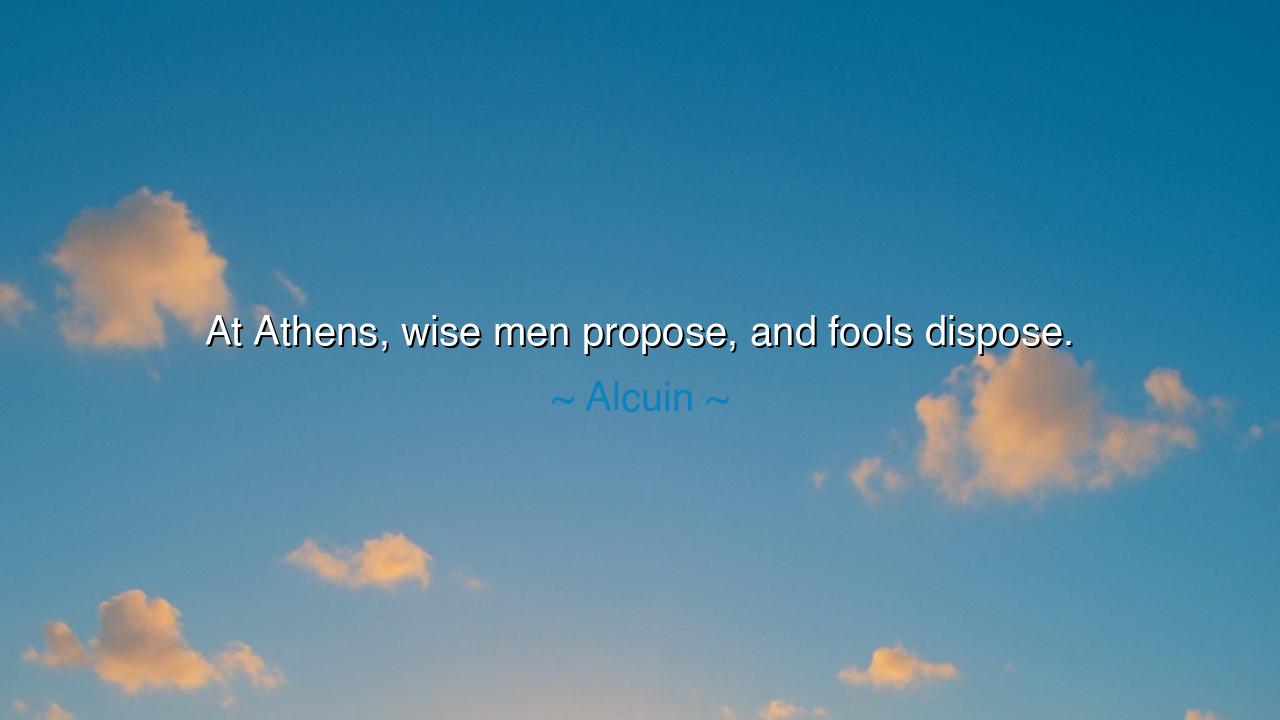
At Athens, wise men propose, and fools dispose.






O seekers of wisdom, listen carefully to the words of Alcuin, a sage who lived in the days of great intellectual ferment. He spoke thus: “At Athens, wise men propose, and fools dispose.” These words, though simple in their phrasing, contain a profound truth about the nature of governance, decision-making, and the often tragic divide between reason and folly. In the grand city of Athens, the cradle of philosophy and wisdom, it was the wise who laid the groundwork for the future of civilization, yet it was often the foolish who held the power to enact it. This tension between the proposer and the disposer is a theme that has echoed through the corridors of history, from the days of Socrates to the modern world.
In the ancient city of Athens, a place where the greatest minds of history gathered, the wise men—philosophers, scholars, and statesmen—were revered for their deep understanding of the world and its complexities. Yet, despite their wisdom, they were often relegated to the role of advisors rather than rulers. The true power of decision-making lay with the foolish—those who were swayed by emotions, personal gain, or the pressures of public opinion. Alcuin’s words remind us of the ancient truth: that wisdom, though vital, does not always have the power to change the course of events when fools hold the levers of power.
Consider, O children, the story of Socrates, that noble philosopher who sought to awaken the minds of the people of Athens. Socrates proposed a life of inquiry, virtue, and intellectual honesty. He showed the people of Athens that the greatest life is one of constant learning, of questioning the status quo, and of seeking truth over comfort. Yet, despite his profound wisdom, Socrates was condemned to death by the very city he sought to improve. The fools who disposed of him—those who feared change, who were blinded by their own pride and ignorance—saw in his wisdom a threat rather than a boon. It was not his wisdom but the foolishness of his accusers that led to his unjust fate. This, O seekers, is the tragedy of the world: the wise may offer solutions, but the foolish often determine the outcome.
Plato, the great student of Socrates, witnessed firsthand the tragic fate of his teacher, and in his writings, he mourned the gulf between wisdom and the folly of those in power. In his Republic, Plato envisioned a society ruled not by the whims of the many, but by philosopher-kings, wise men who understood the true nature of justice and the human soul. Yet, even Plato knew that such a vision was difficult to achieve, for the masses were often swayed by those who did not understand the deeper truths of the world. It is this tension between the wisdom of the few and the foolishness of the many that Alcuin so keenly observed in Athens, and which remains ever relevant in our time.
O children of wisdom, the lesson here is clear: the world is not always ruled by the wise, for it is often the fools who hold the power to dispose of their proposals. This tension between the proposer and the disposer is not a new phenomenon—it is as old as civilization itself. Alcuin’s words are a cautionary tale, urging us to recognize the deep responsibility we have, not only as thinkers and philosophers but also as participants in the great dance of society. Wisdom is not enough in itself; it must be coupled with the courage to stand against the forces of ignorance and foolishness that seek to turn the tide of reason and truth.
In our own time, we must ask ourselves: how often do we see the wise ignored, their proposals cast aside by those who are too consumed by short-term desires or the ease of popular opinion? How often do the voices of reason fall silent in the face of those who, through ignorance or selfishness, choose the path of least resistance? The challenge, O children, is not just to cultivate wisdom, but to have the strength to defend it, to speak out in the face of foolishness, and to ensure that the wisdom of our time is not lost to the whims of short-sightedness.
Thus, let this be your guiding principle: always seek the counsel of the wise, but recognize the forces that dispose of wisdom when those in power are blind to it. Strive to live not only in pursuit of knowledge but in the service of truth and justice, knowing that in doing so, you may one day be called to stand against the forces of foolishness that threaten to overshadow the wisdom of ages. Wisdom, like Socrates, may be disregarded, but it is through our dedication to it—through our actions, our words, and our lives—that we keep its flame alive in a world that too often prefers the darkness.






AAdministratorAdministrator
Welcome, honored guests. Please leave a comment, we will respond soon